Waste A to Z
Find out what goes in which bin
To find information online, please use our accessible search function below.
If the item you are looking for is not listed, please contact us at waste@eastcambs.gov.uk. We will advise you of the best method of disposal and add it to the online search.
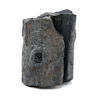 Ash (wood)
Ash (wood)
Wood ash can be used on your garden by adding directly to the soil around plants.
If you cannot do the preferred option please see alternative options below:
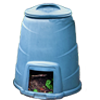
Composting is a natural process that turns your kitchen and garden waste into a valuable and nutrient-rich food for your garden. For more information about home composting, please visit Recycle Now’s website (external link)
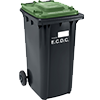
Allow to completely cool and then bag it in a paper bag and put in your green bin. It must be bagged or it will blow out when the bin is emptied, and can be a hazard for our bin collectors.
Your food and garden waste from green lidded bin is turned into compost. You can put things straight into the green bin. You can wrap food waste in newspaper or put it in a paper bag. Please do not use biodegradable plastic or corn starch bags. These do not break down quickly enough and result in extra processing costs. Your bin could also be refused collection.
More information on how the compost is made, can be found on RECAP’s website (external link)
You can check your bin collection dates on our bin collection day page (external link)
 Bed linens
Bed linens
Re-use or donate
Textile recycling points
Duvets and pillows
If you cannot do the preferred option please see alternative options below:
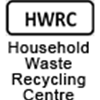
Please check Cambridgeshire County Council’s website (external link) before you visit Witchford Household Recycling Centre.

Composting is a natural process that turns your kitchen and garden waste into a valuable and nutrient-rich food for your garden. For more information about home composting, please visit Recycle Now’s website (external link)
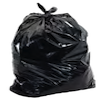
Black sacks go through a mechanical and biological sorting process before going to landfill. Find out more about this process on RECAP's website (external link)
You can check your waste collection dates on our bin collection day page (external link)
 Cardboard
Cardboard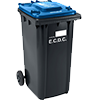
Materials from your blue lidded bin are sorted and turned into new products. Please put things in the bin loose and not in bags. This helps us process it.
More information on how your recycling is processed can be found on RECAP’s website (external link)
You can check your bin collection dates on our bin collection day page (external link)
If you cannot do the preferred option please see alternative options below:

Please check Cambridgeshire County Council’s website (external link) before you visit Witchford Household Recycling Centre.

Composting is a natural process that turns your kitchen and garden waste into a valuable and nutrient-rich food for your garden. For more information about home composting, please visit Recycle Now’s website (external link)

Small amount of cardboard can be added to green bin to stop food and garden waste sticking to the bottom and side of the bin. Please make sure there are no tape or stickers left on cardboard.
Your food and garden waste from green lidded bin is turned into compost. You can put things straight into the green bin. You can wrap food waste in newspaper or put it in a paper bag. Please do not use biodegradable plastic or corn starch bags. These do not break down quickly enough and result in extra processing costs. Your bin could also be refused collection.
More information on how the compost is made, can be found on RECAP’s website (external link)
You can check your bin collection dates on our bin collection day page (external link)
 Cardboard egg boxes
Cardboard egg boxes
Re-use
If you cannot do the preferred option please see alternative options below:

Composting is a natural process that turns your kitchen and garden waste into a valuable and nutrient-rich food for your garden. For more information about home composting, please visit Recycle Now’s website (external link)

Materials from your blue lidded bin are sorted and turned into new products. Please put things in the bin loose and not in bags. This helps us process it.
More information on how your recycling is processed can be found on RECAP’s website (external link)
You can check your bin collection dates on our bin collection day page (external link)

Please check Cambridgeshire County Council’s website (external link) before you visit Witchford Household Recycling Centre.
 Christmas trees (real)
Christmas trees (real)
Composting is a natural process that turns your kitchen and garden waste into a valuable and nutrient-rich food for your garden. For more information about home composting, please visit Recycle Now’s website (external link)
If you cannot do the preferred option please see alternative options below:

Cut up and put pieces in the bin with the lid fully closed. In January, we collect real Christmas trees that are cut into pieces that are not higher or wider than the bin. Check you bin collection dates for the exact dates we collect in your area.
Your food and garden waste from green lidded bin is turned into compost. You can put things straight into the green bin. You can wrap food waste in newspaper or put it in a paper bag. Please do not use biodegradable plastic or corn starch bags. These do not break down quickly enough and result in extra processing costs. Your bin could also be refused collection.
More information on how the compost is made, can be found on RECAP’s website (external link)
You can check your bin collection dates on our bin collection day page (external link)
 Coffee filters
Coffee filters 
Reduce waste
If you cannot do the preferred option please see alternative options below:

Composting is a natural process that turns your kitchen and garden waste into a valuable and nutrient-rich food for your garden. For more information about home composting, please visit Recycle Now’s website (external link)

Your food and garden waste from green lidded bin is turned into compost. You can put things straight into the green bin. You can wrap food waste in newspaper or put it in a paper bag. Please do not use biodegradable plastic or corn starch bags. These do not break down quickly enough and result in extra processing costs. Your bin could also be refused collection.
More information on how the compost is made, can be found on RECAP’s website (external link)
You can check your bin collection dates on our bin collection day page (external link)
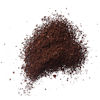 Coffee grounds
Coffee grounds
Composting is a natural process that turns your kitchen and garden waste into a valuable and nutrient-rich food for your garden. For more information about home composting, please visit Recycle Now’s website (external link)
If you cannot do the preferred option please see alternative options below:

Your food and garden waste from green lidded bin is turned into compost. You can put things straight into the green bin. You can wrap food waste in newspaper or put it in a paper bag. Please do not use biodegradable plastic or corn starch bags. These do not break down quickly enough and result in extra processing costs. Your bin could also be refused collection.
More information on how the compost is made, can be found on RECAP’s website (external link)
You can check your bin collection dates on our bin collection day page (external link)
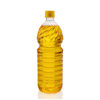 Cooking oil
Cooking oil
Never pour fats down the drain
Compost at home or use the green lidded bin
Household waste recycling centre
If you cannot do the preferred option please see alternative options below:

Please check Cambridgeshire County Council’s website (external link) before you visit Witchford Household Recycling Centre.
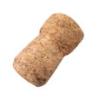 Cork - real
Cork - real
Composting is a natural process that turns your kitchen and garden waste into a valuable and nutrient-rich food for your garden. For more information about home composting, please visit Recycle Now’s website (external link)
If you cannot do the preferred option please see alternative options below:

Your food and garden waste from green lidded bin is turned into compost. You can put things straight into the green bin. You can wrap food waste in newspaper or put it in a paper bag. Please do not use biodegradable plastic or corn starch bags. These do not break down quickly enough and result in extra processing costs. Your bin could also be refused collection.
More information on how the compost is made, can be found on RECAP’s website (external link)
You can check your bin collection dates on our bin collection day page (external link)
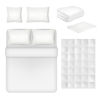 Duvets and pillows
Duvets and pillows
If you cannot do the preferred option please see alternative options below:

Please check Cambridgeshire County Council’s website (external link) before you visit Witchford Household Recycling Centre.

Composting is a natural process that turns your kitchen and garden waste into a valuable and nutrient-rich food for your garden. For more information about home composting, please visit Recycle Now’s website (external link)

Black sacks go through a mechanical and biological sorting process before going to landfill. Find out more about this process on RECAP's website (external link)
You can check your waste collection dates on our bin collection day page (external link)
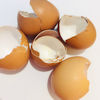 Egg shells
Egg shells
Composting is a natural process that turns your kitchen and garden waste into a valuable and nutrient-rich food for your garden. For more information about home composting, please visit Recycle Now’s website (external link)
If you cannot do the preferred option please see alternative options below:

Your food and garden waste from green lidded bin is turned into compost. You can put things straight into the green bin. You can wrap food waste in newspaper or put it in a paper bag. Please do not use biodegradable plastic or corn starch bags. These do not break down quickly enough and result in extra processing costs. Your bin could also be refused collection.
More information on how the compost is made, can be found on RECAP’s website (external link)
You can check your bin collection dates on our bin collection day page (external link)
 Fat
Fat
Never pour fats down the drain
Compost at home or use the green lidded bin
Household waste recycling centre
If you cannot do the preferred option please see alternative options below:

Please check Cambridgeshire County Council’s website (external link) before you visit Witchford Household Recycling Centre.
 Food waste
Food waste
Composting is a natural process that turns your kitchen and garden waste into a valuable and nutrient-rich food for your garden. For more information about home composting, please visit Recycle Now’s website (external link)
If you cannot do the preferred option please see alternative options below:

Your food and garden waste from green lidded bin is turned into compost. You can put things straight into the green bin. You can wrap food waste in newspaper or put it in a paper bag. Please do not use biodegradable plastic or corn starch bags. These do not break down quickly enough and result in extra processing costs. Your bin could also be refused collection.
More information on how the compost is made, can be found on RECAP’s website (external link)
You can check your bin collection dates on our bin collection day page (external link)
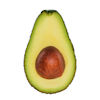 Fruit pits or stones
Fruit pits or stones
Composting is a natural process that turns your kitchen and garden waste into a valuable and nutrient-rich food for your garden. For more information about home composting, please visit Recycle Now’s website (external link)
If you cannot do the preferred option please see alternative options below:

Your food and garden waste from green lidded bin is turned into compost. You can put things straight into the green bin. You can wrap food waste in newspaper or put it in a paper bag. Please do not use biodegradable plastic or corn starch bags. These do not break down quickly enough and result in extra processing costs. Your bin could also be refused collection.
More information on how the compost is made, can be found on RECAP’s website (external link)
You can check your bin collection dates on our bin collection day page (external link)
 Garden waste
Garden waste
Composting is a natural process that turns your kitchen and garden waste into a valuable and nutrient-rich food for your garden. For more information about home composting, please visit Recycle Now’s website (external link)
If you cannot do the preferred option please see alternative options below:

Your food and garden waste from green lidded bin is turned into compost. You can put things straight into the green bin. You can wrap food waste in newspaper or put it in a paper bag. Please do not use biodegradable plastic or corn starch bags. These do not break down quickly enough and result in extra processing costs. Your bin could also be refused collection.
More information on how the compost is made, can be found on RECAP’s website (external link)
You can check your bin collection dates on our bin collection day page (external link)
 Grass cuttings
Grass cuttings
Composting is a natural process that turns your kitchen and garden waste into a valuable and nutrient-rich food for your garden. For more information about home composting, please visit Recycle Now’s website (external link)
If you cannot do the preferred option please see alternative options below:

Your food and garden waste from green lidded bin is turned into compost. You can put things straight into the green bin. You can wrap food waste in newspaper or put it in a paper bag. Please do not use biodegradable plastic or corn starch bags. These do not break down quickly enough and result in extra processing costs. Your bin could also be refused collection.
More information on how the compost is made, can be found on RECAP’s website (external link)
You can check your bin collection dates on our bin collection day page (external link)
 Hedge trimmings
Hedge trimmings
Composting is a natural process that turns your kitchen and garden waste into a valuable and nutrient-rich food for your garden. For more information about home composting, please visit Recycle Now’s website (external link)
If you cannot do the preferred option please see alternative options below:

Your food and garden waste from green lidded bin is turned into compost. You can put things straight into the green bin. You can wrap food waste in newspaper or put it in a paper bag. Please do not use biodegradable plastic or corn starch bags. These do not break down quickly enough and result in extra processing costs. Your bin could also be refused collection.
More information on how the compost is made, can be found on RECAP’s website (external link)
You can check your bin collection dates on our bin collection day page (external link)
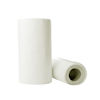 Kitchen roll
Kitchen roll
Composting is a natural process that turns your kitchen and garden waste into a valuable and nutrient-rich food for your garden. For more information about home composting, please visit Recycle Now’s website (external link)
If you cannot do the preferred option please see alternative options below:

Small amount of kitchen paper are suitable for composting. Together with your food and garden waste, it will be turned into compost.
You can put things straight into the green bin. You can wrap food waste in newspaper or put it in a paper bag. Please do not use biodegradable plastic or corn starch bags. These do not break down quickly enough and result in extra processing costs. Your bin could also be refused collection.
More information on how the compost is made, can be found on RECAP’s website (external link)
You can check your bin collection dates on our bin collection day page (external link)

Black sacks go through a mechanical and biological sorting process before going to landfill. Find out more about this process on RECAP's website (external link)
You can check your waste collection dates on our bin collection day page (external link)
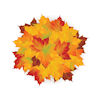 Leaves
Leaves
Composting is a natural process that turns your kitchen and garden waste into a valuable and nutrient-rich food for your garden. For more information about home composting, please visit Recycle Now’s website (external link)
If you cannot do the preferred option please see alternative options below:

Your food and garden waste from green lidded bin is turned into compost. You can put things straight into the green bin. You can wrap food waste in newspaper or put it in a paper bag. Please do not use biodegradable plastic or corn starch bags. These do not break down quickly enough and result in extra processing costs. Your bin could also be refused collection.
More information on how the compost is made, can be found on RECAP’s website (external link)
You can check your bin collection dates on our bin collection day page (external link)
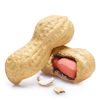 Nut shells
Nut shells
Composting is a natural process that turns your kitchen and garden waste into a valuable and nutrient-rich food for your garden. For more information about home composting, please visit Recycle Now’s website (external link)
If you cannot do the preferred option please see alternative options below:

Your food and garden waste from green lidded bin is turned into compost. You can put things straight into the green bin. You can wrap food waste in newspaper or put it in a paper bag. Please do not use biodegradable plastic or corn starch bags. These do not break down quickly enough and result in extra processing costs. Your bin could also be refused collection.
More information on how the compost is made, can be found on RECAP’s website (external link)
You can check your bin collection dates on our bin collection day page (external link)
 Pizza box
Pizza box
Materials from your blue lidded bin are sorted and turned into new products. Please put things in the bin loose and not in bags. This helps us process it.
More information on how your recycling is processed can be found on RECAP’s website (external link)
You can check your bin collection dates on our bin collection day page (external link)
If you cannot do the preferred option please see alternative options below:

Your food and garden waste from green lidded bin is turned into compost. You can put things straight into the green bin. You can wrap food waste in newspaper or put it in a paper bag. Please do not use biodegradable plastic or corn starch bags. These do not break down quickly enough and result in extra processing costs. Your bin could also be refused collection.
More information on how the compost is made, can be found on RECAP’s website (external link)
You can check your bin collection dates on our bin collection day page (external link)

Composting is a natural process that turns your kitchen and garden waste into a valuable and nutrient-rich food for your garden. For more information about home composting, please visit Recycle Now’s website (external link)

Black sacks go through a mechanical and biological sorting process before going to landfill. Find out more about this process on RECAP's website (external link)
You can check your waste collection dates on our bin collection day page (external link)
 Sawdust, wood shavings or straw pet bedding
Sawdust, wood shavings or straw pet bedding
Composting is a natural process that turns your kitchen and garden waste into a valuable and nutrient-rich food for your garden. For more information about home composting, please visit Recycle Now’s website (external link)
If you cannot do the preferred option please see alternative options below:

Soiled sawdust or wood shavings from rabbit, guinea pig, hamster and gerbil cages can be put in your green bin. If you have large amounts, please put in a paper bag, as the sawdust can blow out over the bin collectors when tipping the bin.
Your food and garden waste from green lidded bin is turned into compost. You can put things straight into the green bin. You can wrap food waste in newspaper or put it in a paper bag. Please do not use biodegradable plastic or corn starch bags. These do not break down quickly enough and result in extra processing costs. Your bin could also be refused collection.
More information on how the compost is made, can be found on RECAP’s website (external link)
You can check your bin collection dates on our bin collection day page (external link)
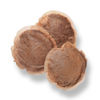 Tea bags and coffee grounds
Tea bags and coffee grounds
Composting is a natural process that turns your kitchen and garden waste into a valuable and nutrient-rich food for your garden. For more information about home composting, please visit Recycle Now’s website (external link)
If you cannot do the preferred option please see alternative options below:

Your food and garden waste from green lidded bin is turned into compost. You can put things straight into the green bin. You can wrap food waste in newspaper or put it in a paper bag. Please do not use biodegradable plastic or corn starch bags. These do not break down quickly enough and result in extra processing costs. Your bin could also be refused collection.
More information on how the compost is made, can be found on RECAP’s website (external link)
You can check your bin collection dates on our bin collection day page (external link)
 Vegetable and fruit peelings
Vegetable and fruit peelings
Composting is a natural process that turns your kitchen and garden waste into a valuable and nutrient-rich food for your garden. For more information about home composting, please visit Recycle Now’s website (external link)
If you cannot do the preferred option please see alternative options below:

Your food and garden waste from green lidded bin is turned into compost. You can put things straight into the green bin. You can wrap food waste in newspaper or put it in a paper bag. Please do not use biodegradable plastic or corn starch bags. These do not break down quickly enough and result in extra processing costs. Your bin could also be refused collection.
More information on how the compost is made, can be found on RECAP’s website (external link)
You can check your bin collection dates on our bin collection day page (external link)
 Weeds
Weeds
If you cannot do the preferred option please see alternative options below:

Composting is a natural process that turns your kitchen and garden waste into a valuable and nutrient-rich food for your garden. For more information about home composting, please visit Recycle Now’s website (external link)

Your food and garden waste from green lidded bin is turned into compost. You can put things straight into the green bin. You can wrap food waste in newspaper or put it in a paper bag. Please do not use biodegradable plastic or corn starch bags. These do not break down quickly enough and result in extra processing costs. Your bin could also be refused collection.
More information on how the compost is made, can be found on RECAP’s website (external link)
You can check your bin collection dates on our bin collection day page (external link)

Please check Cambridgeshire County Council’s website (external link) before you visit Witchford Household Recycling Centre.
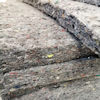 Wool packaging
Wool packaging
Wool packaging insulation, such as from meat deliveries, can be put in a home composter. It takes quite a long time to break down.
Composting is a natural process that turns your kitchen and garden waste into a valuable and nutrient-rich food for your garden. For more information about home composting, please visit Recycle Now’s website (external link)
Wool insulation (or from jumpers) is not suitable for the green bin. This is partly because these kind of fibres can jam the shredding machinery used before composting, and also that wool can take several months to break down. The process used for green bin material takes 6-8 weeks.
If you cannot do the preferred option please see alternative options below:

Black sacks go through a mechanical and biological sorting process before going to landfill. Find out more about this process on RECAP's website (external link)
You can check your waste collection dates on our bin collection day page (external link)
